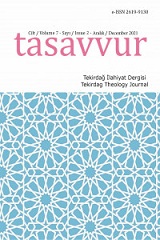İslam ve Demokrasi: Raşid Gannuşi Örneği
Islam and Democracy: The Case of Rashid Ghannouchi
Author(s): Mesut DüzceSubject(s): Islam studies, Government/Political systems, Sociology of Religion
Published by: Tekirdağ Namık Kemal Üniversitesi İlahiyat Fakültesi
Keywords: Sociology of Religion; Rashid Ghannouchi; Islam; Democracy; Islamic Democracy;
Summary/Abstract: There is a long history of debates about the conflict or compatibility between Islam and democracy. The topic attracts the attention of a large number of thinkers and researchers from both the Islamic world and the nonIslamic world and directs their research. The founder and leader of Nahda, which is a political and religious movement in Tunisia, Rashid Ghannouchi, as an activist and intellectual, has made an intense contribution to the discussions on Islam and democracy and still continues to do so. His efforts, both theoretically and practically, appear to prove that Islam and democracy can coexist, moreover, an Islamic democracy is possible. Ghannouchi is known for his commitment to the concept of Islamic democracy. The aim of this study is to try to understand Ghannouchi’s approach on this issue and to analyze his argument that Islam and democracy are compatible with each other. The study also attempts to understand with what reasons and with what motivation Ghannouchi supported the thesis that Islam and democracy do not conflict. After the subject is addressed from different aspects, the author presents his own assessment in the conclusion section.
Journal: Tasavvur Tekirdağ İlahiyat Dergisi
- Issue Year: 7/2021
- Issue No: 2
- Page Range: 1145-1176
- Page Count: 32
- Language: Turkish

